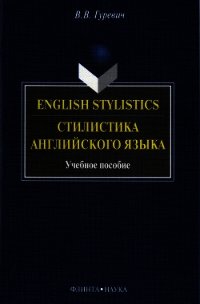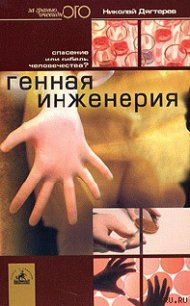English Stylistics. Стилистика английского языка - Гуревич Валерий (читать книги без регистрации TXT) 📗

Жалоба
Напишите нам, и мы в срочном порядке примем меры.
English Stylistics. Стилистика английского языка - Гуревич Валерий (читать книги без регистрации TXT) 📗 краткое содержание
Пособие содержит лекционный раздел, описывающий разные функциональные стили, основные экспрессивные средства, и материал для практических (или семинарских) занятий по темам.
English Stylistics. Стилистика английского языка читать онлайн бесплатно
В. В. Гуревич
English Stylistics. Стилистика английского языка
Part 1
On the Notions of 'Style' and 'Stylistics'
In different situations of communication people use different manners of expressing their thoughts, which, in the Russian linguistic tradition, are usually called styles or functional styles (функциональные стили), and in the linguistic tradition abroad – registers of speech (регистры речи). Stylistics is a branch of linguistics that studies the various functional styles of speech and also the various expressive means and devices (экспрессивные средства и приемы) of language. Apart from that, some linguists apply the term 'stylistics' to the study of various stylistic peculiarities of the language of works of fiction (стилистика художественной речи).
The distinction between a lofty style and a low style of speech (высокий и низкий стили) was put forward as far back as in the 18th century by Michail Lomonosov. However, stylistics as a special branch of linguistics was singled out only towards the middle of the 20th century. Academician V. V. Vinogradov was among the first linguists to describe the different styles of speech in respect to their functions (= aims). He distinguished, in particular:
1) the colloquial style, which has the function of communicating (функция общения);
2) the official and scientific styles, which have the function of informing (функция сообщения);
3) the publicist (публицистический) and belle-lettres (художественно-беллетристический) styles, which have the function of producing an emotional impact (функция эмоционального воздействия) on the listeners.
This classification undoubtedly reflects certain differences between speech styles, although its criteria for the opposition of functions are rather confusing. Thus, for example, the functions of informing and communicating are present in any style (colloquial, official, scientific, publicist, belles-lettres), as speech always contains some information and is used for communicating. Therefore it would probably be more precise to say that the colloquial style is characteristic of the situation of direct communication (when the listener/interlocutor is present during speech), while the other, more bookish styles (official, scientific, publicist) are used in situations of indirect communication (without any listener/interlocutor present during speech).
Moreover, production of emotional impact on the listener/reader is not so much the aim of a special style of speech, but rather the aim of publicist or fiction (belles-lettres) works, which represent particular literary genres (жанры). It goes without saying that such works (texts) have also the function of informing. One more point to mention here is that the study of the language of various works of fiction constitutes a special branch in both linguistics and also in literature theory (литературоведение), and that fiction works themselves generally comprise samples (образцы) of both colloquial style (the speech of the characters) and of bookish style (the speech of the author).
Two Types of Stylistic Information
Every style of speech brings about with it some additional information about the conditions and peculiarities of communication. The choice of style may depend 1) on particular relations between the participants of communication (interlocutors) and 2) on a particular attitude of the speaker to what he says. These two types of stylistic information will be used below as the basis for the classification of styles.
From this point of view, functional styles express the first type of information, i.e. the relations between the interlocutors. In some situations these relations may be unrestrained (непринужденные), friendly, easy-going or intimate, and in that case the speaker chooses the so called informal style of speech, viz. the colloquial style, which is a 'lower' (сниженный) style of speech, characteristic of oral communication. In other situations the relations between the interlocutors may be restrained (сдержанные), strictly official, etc., and then the interlocutors try to be deliberately polite (подчеркнуто вежливыми), and they choose the so called formal style (the lofty, bookish style), which is generally characteristic of written language. The formal style is used in the genres of official or business documents, of scientific or publicist works. These genres, in their turn, may be further subdivided into more particular varieties of genres; for example, official documents may represent an order, instruction, resolution, proceedings of a meeting (протокол заседания), report, application (заявление), etc.
It is natural for speakers to try to avoid any confusion of formal and informal styles within one text, as such a confusion might give the wrong idea of the relations between the interlocutors: e.g. a letter to a person of higher authority cannot begin with words like 'Hi, how are you doing?', which would bear a sense of familiarity. But at the same time it is well worth mentioning that there may be samples of speech (oral or written) which are not clearly marked by features of any particular style, and which can therefore be regarded as a "neutral" style, suitable for any communicative situations.
Besides the formal and informal functional styles mentioned above (which reflect the relations between interlocutors), there are also stylistic characteristics of speech that reflect the attitude of the speaker to the content of his speech. This second type of stylistic information concerns the emotional character of speech, viz. the presence or absence of emotional or evaluative (оценочный) elements. In this respect we can distinguish:
1) an emotionally coloured style of speech
2) a deliberately unemotional (подчеркнуто безэмоциональный), or "cold" style of speech
3) a neutral style of speech
Emotionally coloured speech may be characterized, on the one hand, by a lofty emotional colouring (приподнятая эмоциональная окраска), such as solemn (торжественная), passionate (патетическая), ironic, wrathful (гневная), sarcastic (саркастическая), etc., or, on the other hand, by a lower colouring (сниженная окраска), such as jocular/humorous (шутливая), derogatory (уничижительная), rude (грубая), disapproving (неодобрительная), endearing (ласкательная), etc.
The lofty emotional colouring is characteristic of the publicist/oratory style, while the lower emotional colouring is typical of colloquial style. The deliberately unemotional character of speech is typical of the formal ('cold') styles, such as scientific, official or business speech, where the speaker tends to make his speech impersonal and avoid any emotional or evaluating elements.
Apart from the two directly opposed styles – the emotionally coloured and the deliberately unemotional – there may also be intermediate, stylistically neutral speech, which is neither emotionally coloured nor deliberately devoid of emotion. Thus, there may be samples of speech that are neutral both with respect to the relations between the interlocutors and with respect to the speaker's attitude toward what he says.
Stylistic differences of any kind can be expressed by various language means: phonetic, lexical or grammatical. One of the most vivid means is, naturally, the choice of vocabulary.
Stylistic Characteristics of English Vocabulary
With respect to the functional styles, vocabulary can be subdivided into bookish (literary), which is typical of formal styles (scientific, official, business, publicist), and colloquial vocabulary which is typical of the lower style (colloquial). In addition, there is always present in the language a stylistically neutral vocabulary, which can be used in all kinds of style. Cf:




